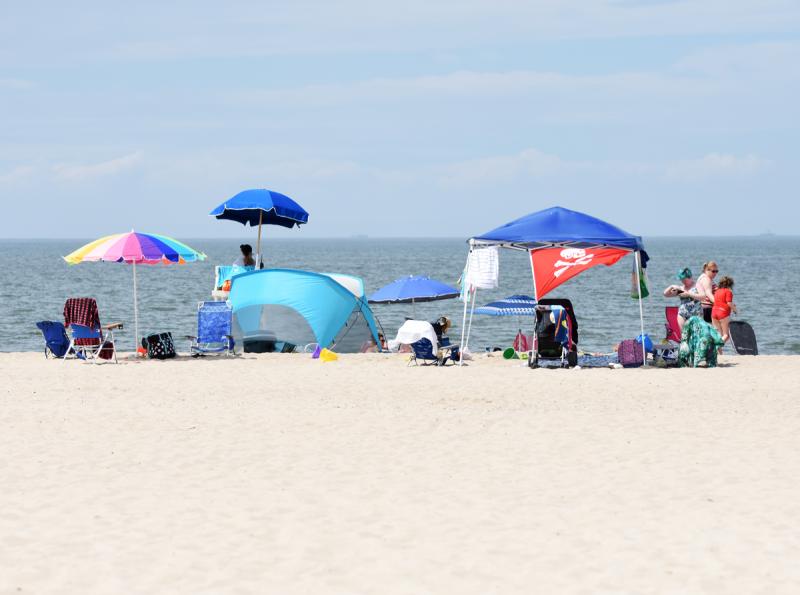Lewes Beach capacity analysis provides unclear picture for parking
When Lewes Beach reaches its full capacity on summer weekends, there may not be enough parking available to accommodate all who want to visit the shore.
City engineer Charlie O’Donnell presented an analysis that he and his team completed to determine how many people are coming to the beach.
For the exercise, O’Donnell used a satellite image taken on July 3, 2010, the busiest day of that particular summer. He acknowledged that a lot has changed in the 10 years since the photo was taken, but used it as a jumping-off point for discussion.
He determined there was roughly 300,000 square feet of useable beach space between the end of the main beach and Roosevelt Inlet. Based on the satellite imagery, he counted about 75 people per block – 1,800 to 2,200 people on that entire 25-block stretch of beach.
He made the assumption that 50 percent of the people on the beach drove and parked their vehicles, translating to a need for 12 to 15 parking spaces somewhere in the vicinity, whether on a residential street between Bay Avenue and Cedar Street, on Cedar Street itself or across Cedar Street on the marsh side of the beach community.
While O’Donnell said it appeared there was adequate parking on that particular day, committee member Kevin McGuiness argued that many things have changed, specifically that the city has eliminated parking on one side of many streets. It has also restricted parking along Cedar Street 30 feet from intersections.
“The beach has gotten more crowded in the last decade, based on my experience going to the beach every year in that decade,” McGuiness said. “That means there’s more pressure on parking spaces now than before.”
Though most agree Lewes Beach is more popular than ever, O’Donnell said it pales in comparison to Rehoboth Beach. He analyzed satellite images taken the same day in Rehoboth, and he found the beach was nearly four times more crowded than Lewes.
Committee member Dennis Reardon said the dune continues to grow larger every year, reducing the useable beach space. Sea-level rise isn’t helping the situation either, he said.
Committee member Khalil Saliba agreed the beach is getting busier as it shrinks.
“Everyone is coming to the beach,” he said. “There are no trends saying that it will slow down. I think 10 years is a long time, and we need to look at more recent data.”
Bicycles
Among the recommendations the committee plans to make to mayor and city council is adding small bike racks at several dune crossings to encourage people to ride their bikes to the beach. McGuiness, who developed the recommendation, said the city should do it in a way that is not intrusive.
“Anything to get it started would be a great improvement to the city,” he said.
Reardon agreed the addition of small racks would be positive.
“I think we should stagger them to see what kind of use they get,” he said. “If they get used, then we can increase them.”
No-parking areas
McGuiness also offered a recommendation that the city take a look at several no-parking zones in the residential area of the beach. He said there does not seem to be consistency in how the city determines an area should be off limits.
In his motion, McGuiness said the city should provide clarity and give priority to public safety, emergency vehicle access and ensuring every street is accessible to vehicle traffic during the busiest times of the year.
Parking enforcement
Police Chief Tom Spell said parking enforcement in the beach community is a challenge for his force, but increased staffing could make it more manageable.
“With our current resources, it’s extremely difficult with one or two officers covering the entire city,” he said. “It’s really difficult, but not impossible.”
McGuiness said policies developed by previous parking committees have not fared well because enforcement is lacking.
“We want to make sure the rules are enforced,” he said. “You can’t have all this work done and rules established if they’re not enforced.”
That could be accomplished by adding seasonal police officers for the summer or beefing up the parking enforcement staff that currently only monitors the public parking lots at the beach, and meters and lots downtown.
Spell has requested 10 seasonal officers for the 2021 summer season, but he is not convinced they’re best utilized by enforcing parking. He said more parking enforcement staff is more appropriate.
Councilman Rob Morgan said that while parking enforcement staff cannot ticket visitors for littering or other conduct-related issues, their presence on residential streets could act as a deterrent.
The parking enforcement issue and all other topics discussed by the committee over the last few months will be up for consideration at the group’s final meeting at 3 p.m., Tuesday, Jan. 26. At the meeting, committee members will review and finalize a report with recommendations to mayor and city council.
Nick Roth is the news editor. He has been with the Cape Gazette since 2012, previously covering town beats in Milton and Lewes. In addition to serving on the editorial board and handling page layout, Nick is responsible for the weekly Delaware History in Photographs feature and enjoys writing stories about the Cape Region’s history. Prior to the Cape Gazette, Nick worked for the Delmarva Media Group, including the Delaware Wave, Delaware Coast Press and Salisbury Daily Times. He also contributed to The News Journal. Originally from Boyertown, Pa., Nick attended Shippensburg University in central Pennsylvania, graduating in 2007 with a bachelor’s degree in journalism. He’s won several MDDC awards during his career for both writing and photography. In his free time, he enjoys golfing, going to the beach with his family and cheering for Philadelphia sports teams.





















































